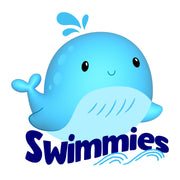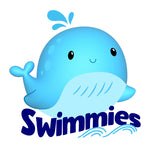Group Lessons
Welcome to our guide on group lessons for babies and toddlers! In this comprehensive resource, we will explore the world of structured swimming sessions designed specifically for our little ones.
Group lessons provide a fantastic opportunity for babies and toddlers to learn essential swimming techniques, develop water safety skills, and build confidence in the water. These interactive sessions create a fun and engaging environment where children can interact with peers and experienced instructors.
In this guide, we will discuss the importance of group lessons, how they work, and the benefits they offer. We will also explore potential downsides to consider and alternative options available for those who may not prefer the group setting. Let's dive in!
Make bath time a splash-filled adventure for your little explorer! Explore Swimmies' wonderful collection of bath toys and let your baby's imagination run wild. Dive in with Swimmies and create waves of joy that your child will never forget!
What Are Group Lessons?
Group lessons refer to structured swimming sessions designed for babies and toddlers. These interactive sessions provide a fun and engaging environment for little ones to learn swimming techniques and water safety skills.

Dive Into A World Of Aquatic Joy For Your Precious Little Ones!Discover the magic of swimtime with our premium baby swimming gear. From adorable baby water products to secure floaties and delightful bath toys, we're dedicated to ensuring every splash is filled with laughter and safety.
Join the fun-loving community of parents who trust Swimmies to provide the very best for their little water explorers. Dive in today and let the aquatic adventures begin! |
Why Are Group Lessons Important?
Group lessons play a crucial role in the early development of babies and toddlers, helping to instill confidence and build essential swimming skills. Here's why group lessons are important:
- Social Interaction: Group lessons allow babies and toddlers to interact with peers and instructors, fostering social skills and aiding in their overall development.
- Water Safety: Through group lessons, children learn vital water safety rules and practices, equipping them with the knowledge to stay safe around water.
- Skill Development: Qualified instructors focus on teaching fundamental swimming techniques, such as floating and kicking, enabling babies and toddlers to develop essential swimming skills at an early age.
- Physical Fitness: Group lessons promote physical activity and help young children improve their balance, coordination, and muscle strength.
How Do Group Lessons Work?
Group lessons typically involve a structured curriculum tailored for babies and toddlers. Here's how group lessons work:
- Registration: Parents or guardians can enroll their children in group lessons through our e-commerce store. Choose the preferred session and make the required payment to secure a spot for your little one.
- Group Formation: Once the registration period ends, children are grouped based on age and skill level to ensure an optimal learning environment for everyone.
- Instructor Guidance: Certified instructors conduct the group lessons, guiding children through various activities and exercises designed to enhance their swimming abilities.
- Fun and Play: Group lessons incorporate playful elements and games to keep children engaged, making the learning experience enjoyable and memorable for all.
What Are The Benefits Of Group Lessons?
Group lessons offer numerous benefits for babies, toddlers, and their parents. Here are the key advantages:
- Boosts Confidence: By learning and practicing swimming skills alongside peers, children gain confidence in the water, making them more comfortable and self-assured.
- Social Development: Interacting with other children in a group setting enhances social skills, fostering friendships and developing teamwork abilities.
- Water Safety Awareness: Group lessons emphasize the importance of water safety, teaching children how to navigate aquatic environments responsibly.
- Skill Progression: Through regular attendance and guidance from skilled instructors, babies and toddlers can steadily improve their swimming techniques and overall physical abilities.
Are There Any Downsides To Group Lessons?
While group lessons offer numerous benefits, it's important to consider potential downsides. Here are a few to keep in mind:
- Limited Individual Attention: In group lessons, instructors strive to provide attention to each child, but individual attention may be limited due to the group setting.
- Different Learning Paces: Children have varying learning paces, and in a group environment, some may progress faster or slower than others, potentially leading to unequal skill development.
What Are The Alternatives To Group Lessons?
If group lessons don't suit your preferences or circumstances, here are some alternative options to consider:
- Private Lessons: Private lessons provide one-on-one instruction, allowing for more personalized attention and tailored learning experiences.
- Parent-Child Classes: Parent-child classes enable parents to actively participate in their child's swimming lessons, creating a stronger bond and facilitating a sense of security.
- Self-Guided Learning: For parents who prefer a more flexible approach, self-guided learning with parental supervision can be an option. However, it's essential to prioritize safety and seek guidance from reliable resources.
Group lessons offer an exciting opportunity for babies and toddlers to develop their swimming skills while having fun and making friends. Whether you choose group lessons, private lessons, or other alternatives, the most important aspect is to ensure a safe and enjoyable swimming experience for your little ones. Dive into the world of water adventures and give your child the gift of swimming proficiency from an early age.
How Effective Is Group Learning?
Group learning is highly effective for babies and toddlers when it comes to swimming lessons. Here's why:
- Peer Motivation: Children in a group setting are motivated by their peers, spurring them to push their boundaries and strive for improvement.
- Enhanced Learning Environment: Group learning fosters a collaborative and interactive environment, allowing children to learn from each other and benefit from shared experiences.
- Increased Practice Opportunities: In a group, children get more opportunities to practice their swimming skills, as they can take turns and engage in various activities.
- Structured Curriculum: Group lessons follow a structured curriculum designed to cater to the developmental needs of children, ensuring comprehensive and effective learning.
Why Is Learning In A Group Better Than Alone?
Learning in a group surpasses individual learning in various aspects. Here's why group learning is better:
- Socialization: Group learning provides opportunities for social interaction, helping children develop essential communication and interpersonal skills.
- Peer Support: Children can support and encourage each other in a group, fostering a positive learning environment and boosting motivation.
- Diverse Perspectives: In a group, children encounter diverse perspectives and approaches to learning, broadening their knowledge base and fostering creative thinking.
- Collaboration Skills: Group learning promotes collaboration, teaching children how to work effectively as a team and enhancing their ability to cooperate with others.
Is It Easier To Learn In Groups?
Learning in groups can make the process easier and more enjoyable for babies and toddlers. Here's why:
- Peer Support: Children receive support and encouragement from their peers, making learning less daunting and enhancing motivation.
- Shared Learning Resources: In a group, children have access to shared learning resources, such as equipment and teaching materials, enriching their learning experience.
- Collaborative Environment: Group learning fosters collaboration and enables children to learn from each other, accelerating their progress.
- Constructive Feedback: Children can provide constructive feedback to each other, helping them refine their skills and improve their techniques.
What Age Groups Are Suitable For Group Swimming Lessons?
Group swimming lessons are suitable for babies and toddlers across various age groups. Here's a breakdown of the age ranges:
- Baby Group: Typically, baby group lessons cater to infants aged 6 months to 2 years. These sessions focus on water acclimation and basic water safety skills.
- Toddler Group: Toddler group lessons accommodate children aged 2 to 4 years. These sessions emphasize foundational swimming techniques, buoyancy, and independent water movement.
- Preschool Group: Preschool group lessons cater to children aged 4 to 6 years, building upon the skills acquired in earlier stages and progressing towards more advanced techniques.
- Age 6 and Above: For children aged 6 and above, separate group lessons or more advanced class levels are available to further develop their swimming abilities.
Final Thoughts On Group Lessons
Group lessons for babies and toddlers provide a valuable opportunity to develop essential swimming skills in a fun and interactive environment. These lessons offer numerous benefits, including improved confidence, social development, and water safety awareness. Whether you choose group lessons or explore alternative options like private lessons or parent-child classes, the key is to prioritize your child's safety and enjoyment in the water.
At Swimmies, we understand the importance of group lessons and the need for high-quality swimming gear for babies and toddlers. Check out our wide range of swimwear, floaties, and bath toys designed specifically for little ones. From adorable swimsuits to comfortable flotation aids and engaging bath toys, we have everything you need to make your child's swimming journey a success.
Plunge into Swimmies' captivating range of baby floaties and craft cherished moments. Embark on their water escapades today and see them flourish with every dip. After all, every ripple tells a story!
Frequently Asked Questions On Group Lessons
How much do group lessons typically cost?
The cost of group lessons can vary depending on factors such as location, duration, and the expertise of the instructors. It's best to check with the e-commerce store or swim school offering the lessons for specific pricing details.
Can beginners take group lessons?
Yes, group lessons are suitable for beginners. In fact, many group lessons are specifically designed for beginners, providing a safe and supportive environment for children to learn and develop their swimming skills.
What is the duration of a typical group lesson?
The duration of a typical group lesson for babies and toddlers usually ranges between 30 to 45 minutes. This timeframe is carefully planned to ensure optimal attention span and engagement for young children.
Do group lessons follow a structured curriculum?
Yes, group lessons typically follow a structured curriculum designed specifically for babies and toddlers. These curricula are tailored to progress children through various skill levels and ensure a comprehensive learning experience.
Can I switch to private lessons after enrolling in group lessons?
Yes, it is often possible to switch to private lessons after enrolling in group lessons. However, it's recommended to consult with the e-commerce store or swim school to discuss the availability and any additional costs associated with private lessons.
What kind of feedback can students expect in group lessons?
In group lessons, instructors provide constructive feedback to guide students in improving their swimming techniques. They will offer verbal instructions, demonstrations, and hands-on support, ensuring that each child receives valuable feedback to enhance their skills.
Can I join a group lesson at any point in time?
Typically, group lessons have specific start dates and registration periods. It's best to check with the e-commerce store or swim school offering the lessons to determine the available dates and secure a spot in the desired group.
What equipment is necessary for a group lesson?
For group lessons, children will usually require swimwear, such as swimsuits or swim diapers, and swim caps. It's also recommended to bring towels, goggles, and flotation devices if necessary. The specific equipment requirements may vary, so it's essential to check with the e-commerce store or swim school for a detailed list.
Are there group lessons for various age groups?
Yes, group lessons are often divided into specific age groups to ensure age-appropriate instruction and skill development. These age groups can range from infant/baby, toddler, preschool, and beyond. Each group focuses on the unique needs and developmental stages of the children within that age range.
How regularly do group lessons meet?
Group lessons generally have a set schedule, typically meeting once or twice a week. The frequency of the lessons may vary depending on the swim school's program and the specific group level. It's advisable to inquire with the e-commerce store or swim school for the exact meeting schedule of the desired group.

